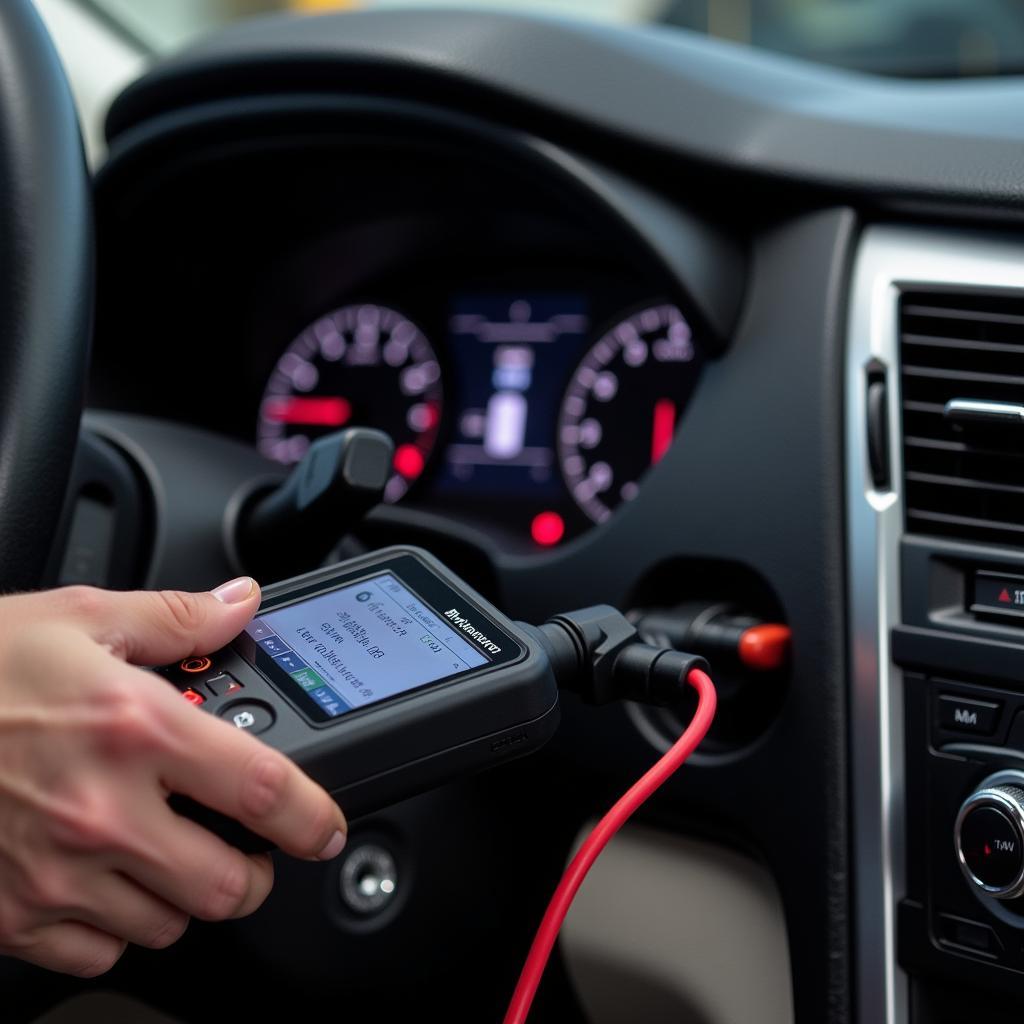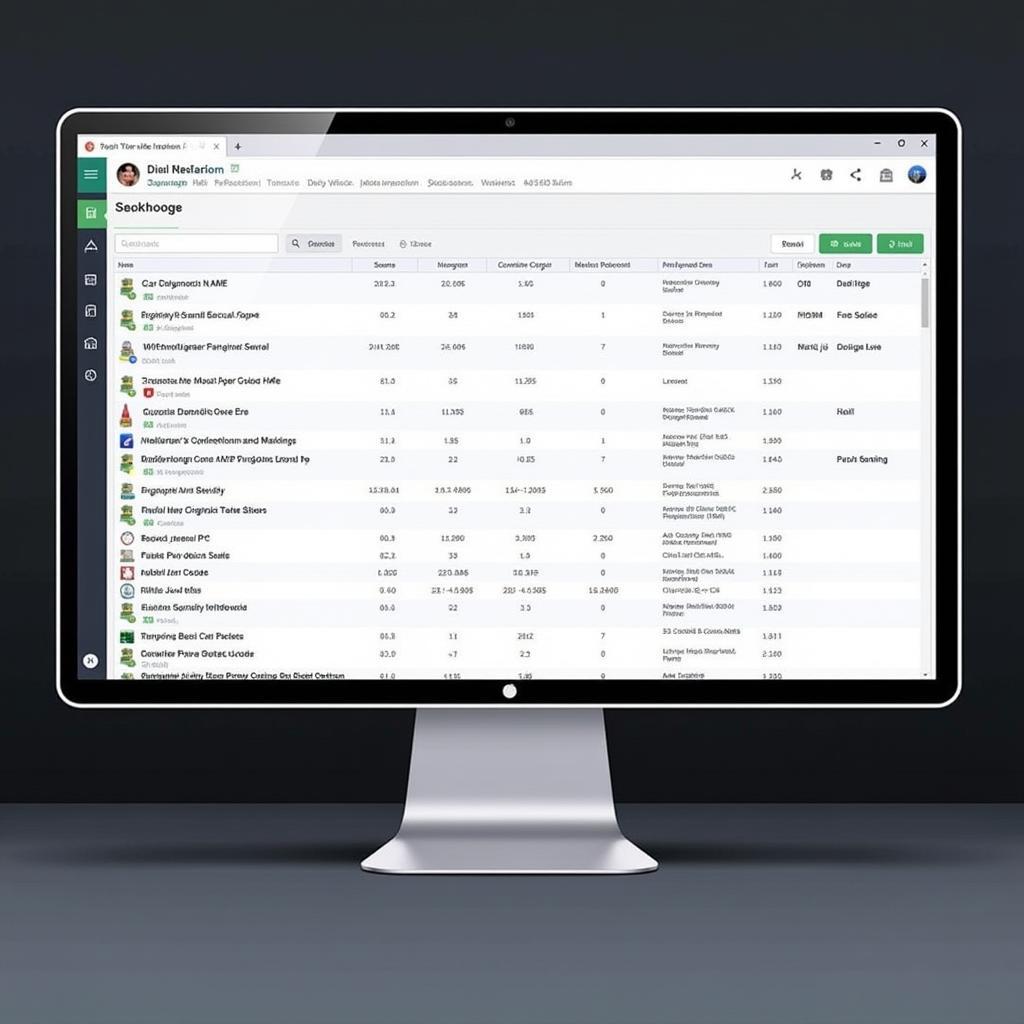A car diagnostic is an electronic assessment of your vehicle’s computer systems. It uses specialized software and hardware, often referred to as a car diagnostic scanner, to communicate with your car’s onboard computer. This process retrieves and analyzes data to pinpoint any underlying issues affecting your vehicle’s performance, safety, or emissions.
Delving Deeper into Car Diagnostics
Gone are the days of relying solely on a mechanic’s intuition and visual inspections to diagnose car problems. Today’s vehicles are complex machines with intricate electronic systems controlling everything from engine performance to airbag deployment. This is where car diagnostics come in as an essential tool for mechanics and car owners alike.
A car diagnostic works by plugging a scanner into your car’s OBD-II port, typically located under the dashboard on the driver’s side. This port acts as the gateway to your car’s central computer, often called the Engine Control Unit (ECU).
 Car Diagnostic Scanner Connected to OBD-II Port
Car Diagnostic Scanner Connected to OBD-II Port
Once connected, the scanner retrieves Diagnostic Trouble Codes (DTCs) stored in the ECU. These codes are essentially standardized error messages triggered when your car’s sensors detect unusual activity or readings. Each DTC corresponds to a specific problem area within your vehicle’s systems.
Understanding Diagnostic Trouble Codes (DTCs)
Imagine DTCs as your car’s way of saying, “Hey, something’s not right here!” These codes are crucial for understanding what’s happening under the hood. For instance, a DTC related to the engine might indicate a misfiring cylinder, while a code from the transmission system might signal a faulty sensor.
It’s important to note that DTCs are just starting points for diagnosis. They don’t always pinpoint the exact problem, but rather guide mechanics in the right direction. Further investigation, such as visual inspections, component testing, and analysis of live data streams, is often needed to confirm the root cause of the issue.
Benefits of Car Diagnostics
Regular car diagnostics offer numerous benefits for car owners:
- Early Problem Detection: Identifying issues early can prevent minor problems from escalating into major (and expensive) repairs.
- Improved Performance: Addressing underlying issues can restore your vehicle’s optimal performance, fuel efficiency, and overall drivability.
- Enhanced Safety: Diagnosing problems related to brakes, airbags, or other safety systems ensures your vehicle remains safe on the road.
- Informed Decision Making: Understanding your car’s health empowers you to make informed decisions about repairs, maintenance, and even potential car purchases.
 Car Diagnostic Report on Computer Screen
Car Diagnostic Report on Computer Screen
When Should You Get a Car Diagnostic?
While regular car diagnostics are always recommended, certain situations warrant immediate attention:
- Check Engine Light: This is your car’s primary way of signaling a potential issue.
- Unusual Noises or Smells: Any unusual noises coming from the engine or exhaust, or unusual smells inside the car, could indicate a problem.
- Performance Issues: Experiencing rough idling, stalling, decreased fuel efficiency, or other performance problems? A car diagnostic can help.
- Before Buying a Used Car: Always get a pre-purchase inspection that includes a car diagnostic to assess the vehicle’s condition before making a decision.
Car Diagnostics: Empowering Car Owners and Mechanics
In the ever-evolving world of automotive technology, car diagnostics have become indispensable. For car owners, they provide peace of mind and help avoid unexpected breakdowns. For mechanics, car diagnostic interface scanners are invaluable tools for accurate and efficient troubleshooting. By understanding what a car diagnostic is and the benefits it offers, you can take a proactive approach to vehicle maintenance and ensure a safe and enjoyable driving experience.
“Car diagnostics have revolutionized the way we approach car repairs,” says John Smith, a seasoned automotive engineer at DiagFixPro. “They allow us to pinpoint issues with greater precision and efficiency, saving car owners time and money in the long run.”
Frequently Asked Questions About Car Diagnostics
1. How much does a car diagnostic cost?
The cost of a car diagnostic can vary depending on your location, the mechanic, and the complexity of the issue. However, you can expect to pay anywhere from $50 to $150 for a basic diagnostic scan. For more details on pricing, check out our guide on how much a car AC diagnostic cost.
2. Can I do a car diagnostic myself?
Yes, affordable OBD-II scanners are available for purchase. However, interpreting the results and conducting further diagnosis often requires specialized knowledge and experience.
3. How often should I get a car diagnostic?
It’s generally recommended to get a car diagnostic at least once a year or every 12,000 miles, whichever comes first. You can also find out where to get a full car diagnostic on our website.
4. Will a car diagnostic void my warranty?
No, a car diagnostic itself will not void your warranty.
5. What Is A Car Diagnostic test?
A car diagnostic test is simply another term for a car diagnostic. It refers to the process of connecting a scanner to your car’s OBD-II port to retrieve and analyze diagnostic information. For more information on this, you can read our article on what is a car diagnostic test.
6. What is a car diagnostic scanner?
A car diagnostic scanner is an electronic device that communicates with your car’s computer to retrieve diagnostic trouble codes (DTCs) and other relevant data.
7. Can a car diagnostic fix my car?
No, a car diagnostic is just the first step in the repair process. It identifies potential problems, but it doesn’t fix them. Repairs must be carried out separately based on the diagnostic findings.
Common Car Diagnostic Questions
Scenario 1: My check engine light is on, but my car seems to be running fine. Do I still need a car diagnostic?
Answer: Yes, absolutely. Even if your car seems to be running normally, a glowing check engine light indicates that your vehicle’s ECU has detected a potential issue. Ignoring it could lead to more serious problems down the line.
Scenario 2: I recently replaced a part on my car, and now the check engine light is on. Could the car diagnostic be wrong?
Answer: While car diagnostics are generally very accurate, it’s possible that the new part was not installed correctly or is faulty itself, triggering the check engine light.
Scenario 3: I’m planning a road trip. Should I get a car diagnostic beforehand?
Answer: It’s always a good idea to get a car diagnostic before a long road trip. This can help identify any potential issues that could lead to breakdowns or safety concerns while you’re on the road.
For further assistance, consider exploring our other insightful articles on car diagnostics, such as “Understanding Car Diagnostic Interface Scanners” and “Common Car Diagnostic Trouble Codes Explained.” Your car’s well-being is our priority.
We encourage you to reach out for assistance whenever you need expert advice or encounter car troubles. Our dedicated team at DiagFixPro is available 24/7 via WhatsApp at +1(641)206-8880 or email us at [email protected]. We’re always ready to help you navigate the world of car diagnostics and keep your vehicle running smoothly.

Leave a Reply